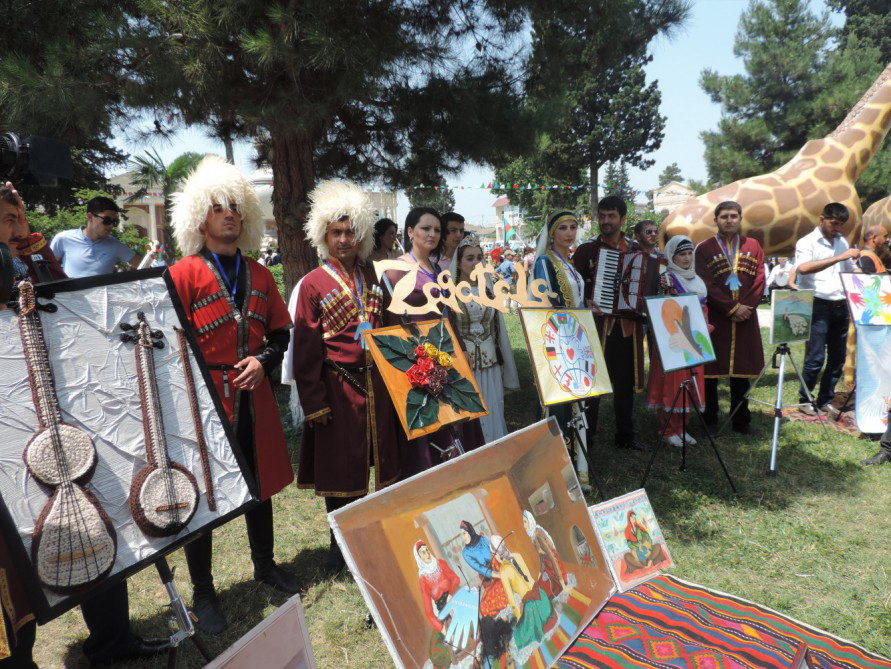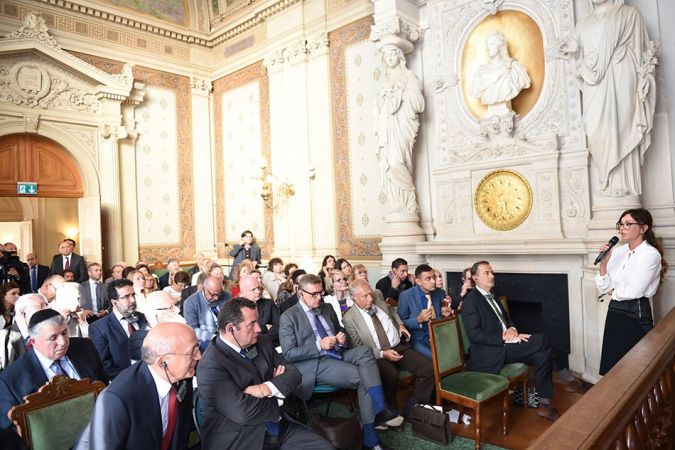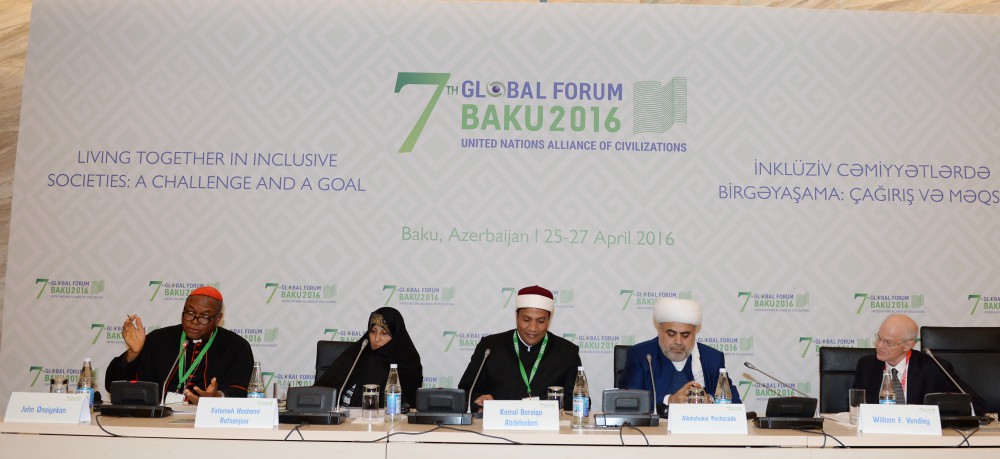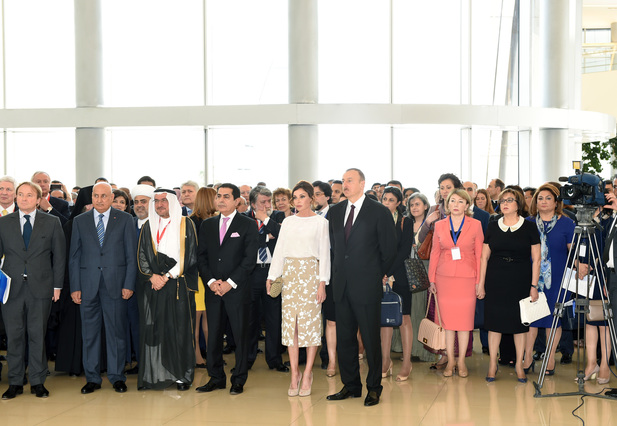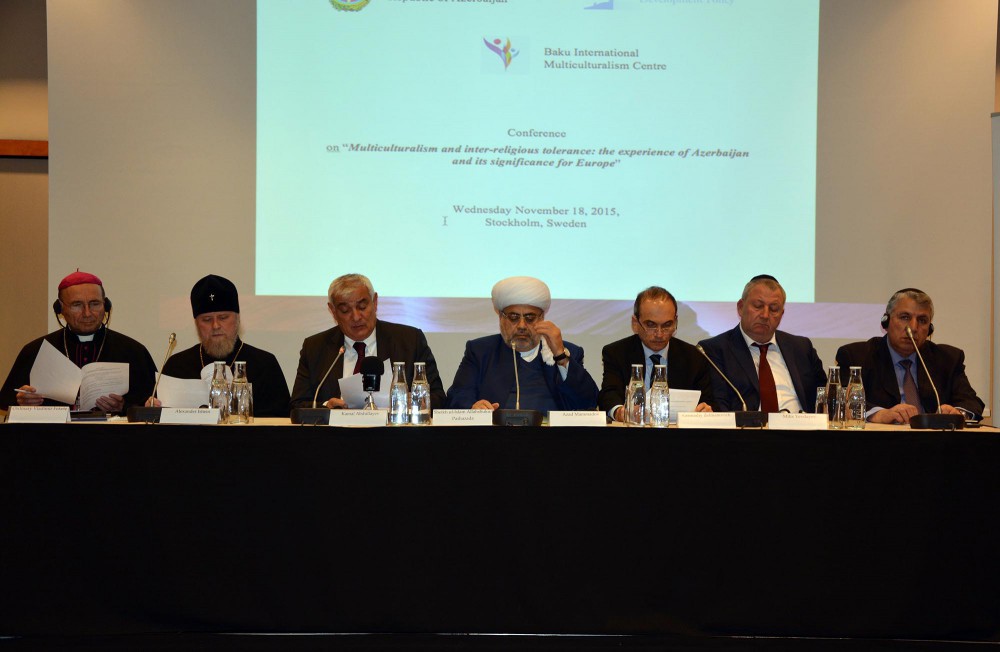Azerbaijan, located at the crossroads of various civilizations throughout many centuries has become famous as a country where was formed the atmosphere of national cultural diversity, where representatives of various nationalities and faiths live in the atmosphere of peace and welfare, mutual understanding and dialogue. The multiculturalism and tolerance historically inherent in the life of Azerbaijanis today became an integral feature of everyday life of each citizen of the Azerbaijani state, irrespective of national identity, language and religion. Not only today’s tolerant manner of life of our people, but also the literary and art, scientific and philosophical, political and legal sources and documents created by this people are the evidence to the rich multicultural past of the Azerbaijani people.
The literal translation of the English word “multiculturalism” means “many cultures”.
Multiculturalism aims at preservation, development and harmonization of cultural diversity of the representatives of various religions and nationalities in separately taken country and in the entire world in general, on integration of the small peoples into national culture of the states.
Under the model of multiculturalism it is understood peaceful co-existence within borders of one state of various ethno-cultural communities having the right to officially express, protect and preserve the cultural features and lifestyle. Multiculturalism represents the necessary instrument for the dialogue of cultures and civilizations.
Multicultural and tolerant values have universal character.Development of multiculturalism, tolerance and religious tolerance at the level of state policy in Azerbaijan is based on ancient history of statehood of the country and on development of these traditions. If to look at historical traditions, we will see that still in the period of the Sefevids’ state and during the era of enlightenment of the XIX-XX centuries, and in the period of the Democratic Republic in the territory of Azerbaijan, along with Azerbaijanis, also lived the representatives of other ethnic and religious groups. At the end of the XX century, thanks to efforts of the national leader Heydar Aliyev, this political behavior has acquired a form of ideology of statehood, and restored were the traditions of tolerance and multiculturalism. Political bases of the Azerbaijani multiculturalism have found its reflection in relevant clauses of articles of the Constitution of the Republic of Azerbaijan, legal acts, decrees and orders.
Azerbaijan is a country of rich cultural and spiritual heritage and traditions of tolerance. Today, this truth is recognized on the international arena.Thanks to the national cultural diversity existing in Azerbaijan, the atmosphere of ethnic and religious tolerance, our Motherland is known as the multinational and multi-religious country, a space of global intercultural dialogue. Today, the state policy which is successfully pursued in the Republic of Azerbaijan aimed at preserving this cultural, linguistic and ethnic diversity necessitates an environment of special care and enrichment of the historical experience in the sphere of multiculturalism, strengthening of promotion of the unique success achieved in the Azerbaijani society in this direction which is saved up for centuries on the international arena.
The political line pursued under Heydar Aliyev’s leadership in the sphere of preserving multicultural traditions of the Azerbaijani people is surely continued and developed by President Ilham Aliyev. The national leader of our people Heydar Aliyev has said: “Every person’s nationality is his/her source of pride. I have always been proud and I am proud today that I am Azerbaijani!” Today these catchwords became a life formula for each worthy citizen of the country.
According to the ideology of Azerbaijanism, and aiming at ensuring preservation of tolerance and cultural, religious, linguistic diversity, as well as for recognition of Azerbaijan in the world as the center of multiculturalism, research and encouragement of the existing multiculturalism models, on order of the President of the Republic of Azerbaijan of February 28, 2014, it was founded the service of the State Counselor on Multiculturalism, Inter-ethnic and Religious Affairs of the Republic of Azerbaijan. And on the order of the President of the Republic of Azerbaijan of May 15, 2014, there was created the Baku International Multiculturalism Center.
On the order of the President of the Republic of Azerbaijan of January 11, 2016, this year was declared the “Year of Multiculturalism”.
One of the major factors stipulating formation in our country of intercultural dialogue is the fact that the space where Azerbaijan is located, geographically is on the junction of the East and West.Today, Azerbaijan, playing a bridge role between the two different civilizations, raises its authority both in the Eastern and Western hemispheres. This idea is also enough reflected in the foreign policy of our state. Today, Azerbaijan is a full member of such authoritative organizations as the UN, OSCE, the Council of Europe, the Organization of Islamic Cooperation, and GUAM. Azerbaijan successfully continues process of integration into Europe within the Eastern Partnership project implemented by the European Union.
The atmosphere of tolerance is always at the highest level in Azerbaijan. That is why many events of the international level, scientific conferences devoted to the questions of multiculturalism, international and inter-religion relations and dialogue are held here. In April 2010 Baku hosted a summit of religious leaders entitled “Globalization, Religion, Traditional Values” in which took part more than 200 delegates from various countries of the world representing traditional world religions. This fact also demonstrates recognition by the international authority of Azerbaijan, expansion and development of the atmosphere of tolerance. Since 2011, on personal initiative of the President of the Republic of Azerbaijan Ilham Aliyev, once in two years Baku hosts the World Forum on intercultural dialogue. Similar forums are held in partnership with the UNESCO, the UN Alliance of Civilizations, the Council of Europe, the North-South Center of the Council of Europe, ISESCO, and the UN World Tourist Organization (UNWTO).
Invaluable merits in development and promotion in our republic of religious tolerance, religious diversity, national and religious tolerance, multiculturalism, national and cultural values belong to the Heydar Aliyev Foundation.
On September 8, 2015, a village called “Azerbaijan in the Heart of Paris” has operated on famous Palais Royal Square before the Louvre Museum where with the Foundation’s organizational support was held a conference titled “Religious tolerance: culture of coexistence in Azerbaijan”, a concert under the motto “The Azerbaijani Music in the Heart of Paris”.On September 26, 2014 at the 69th session of the United Nations General Assembly it was adopted a decision on holding the 7th Global Forum of the United Nations Alliance of Civilizations (UNAOC) in 2016 in Baku. In pursuance of this decision, on April 25-27, 2016, the 7th Global Forum of Alliance of Civilizations of the United Nations took place in Baku. Delegations from more than 140 world countries, representatives of the numerous international organizations, religious faiths, and non-governmental organizations have participated in the Forum.
Holding the 7th Global Forum of the United Nations Alliance of Civilizations in Azerbaijan is an indicator of the existence of multicultural and tolerant environment in our country. Establishment of this form of multiculturalism and its broad application is one of contributions of Azerbaijan to the world community.
Unlike the isolationism, assimilation and apartheid, multiculturalism means that in society, along with one dominating ethnic group, there is also a cultural diversity of other ethnic minorities and immigrants. At the same time, in the world there are a number of states pursuing the aim on various pretexts to provide superiority of their cultures. Activities of such states both in the historical past and at present, directed to assimilation of other ethnos and immigrants, to their physical or moral annihilation, today turn into tradition of a state policy.
Now, there are a number of various models of multiculturalism – model of the USA, Sweden, Australia, Canada. But the multiculturalism model which is presented to the world by Azerbaijan is approved and takes root as model for many progressive states of the world. This model is steadier as it has historical roots. Evident confirmation to that is acceptance by the senates and Houses of Representatives of the Utah and Oregon States (USA) of the declarations approving the Azerbaijani model of tolerance.Today, multiculturalism does not have alternative. We have the right to be proud of the fact that from the point of view of cultural values, our country holds a leading position in this sphere and is perceived by people of the world as an irreplaceable example.
The multiculturalism which has turned into a state policy appears as an invariable lifestyle in modern Azerbaijani society.
Today, a new positive tradition is observed: the tolerant and multicultural reality existing in Azerbaijan is represented to the world not only by Azerbaijanis, but also by the foreign scientists, eminent figures of science, representatives of policy, and students. For this purpose, the service of the State Counselor on Multiculturalism, Inter-ethnic and Religious Affairs of the Republic of Azerbaijan has organized 4 virtual round-tables. Materials of these round-tables devoted to the subjects: “Socio-Economic and Spiritual Development in Harmony in Present-day Azerbaijan”, “Multicultural Security”, “Teaching the subject “Azerbaijani Multiculturalism" at universities of foreign countries: problems and prospects”, “Interest in Azerbaijan turns into love to Azerbaijan (The Azerbaijani multiculturalism in the eyes of local and foreign students)”, were published in the Azerbaijani, Russian and English languages and distributed within the country and abroad.
The famous scientists, public figures and students from Brazil, the USA, Italy, Lithuania, Bulgaria, Turkey, Russia, Georgia, Egypt, Jordan and other countries took part in the virtual round tables.The winter and summer schools project of the Baku International Multiculturalism Center is implemented with the organizational support of “Knowledge Foundation” under the President of the Azerbaijan Republic. Within the “Teaching the subject “Azerbaijani Multiculturalism” at universities of foreign countries: problems and prospects” project,
now the subject “Azerbaijani Multiculturalism” is included in curricula of 13 prestigious higher education institutions of the world countries and 28 higher education institutions of Azerbaijan.The purpose of winter and summer schools consists in creation of conditions in order that the youth became the eyewitness how in our country are protected the multicultural and tolerant values which they acquired theoretically earlier.
In 2016, the book titled “Literary and Art Sources of the Azerbaijani Multiculturalism” from the “Sources of the Azerbaijani Multiculturalism” series was published. The centuries-old multicultural values and traditions of tolerance expressed in works of art of the outstanding writers of Azerbaijan have found their reflection in the book.
On November 26, 2015, Baku hosted the XII session of the General Conference of the Islamic Educational, Scientific and Cultural Organization (ISESCO). Addressing the session, President Ilham Aliyev said: “We are absolutely sure that multiculturalism has a bright future. Just some politicians, public figures should be more attentive in their statements as there is no alternative to multiculturalism. The alternative is discrimination, Islamophobia, xenophobia. This way won’t lead to the future. Therefore, through our policy and initiatives we aspire and we will seek for strengthening of the interreligious relations in the region.”
In 2017, there was held 1 meeting, 5 scientific and methodological seminars, 6 conferences, 7 presentations, 13 roundtable discussions on various topics within the country, as well as 3 roundtable discussions, 3 lecture presentations and 4 conferences organized abroad.
By the end of 2017, the subject "Azerbaijani multiculturalism" was taught in 17 prestigious universities worldwide and 36 in Azerbaijan. Throughout the year, 4 trainings were organized for these instructors both domestically and abroad, and participants were provided with relevant certificates. The 4th International Multiculturalism Winter and Summer Schools under the motto "Multiculturalism as a way of life in Azerbaijan: What does Islamic solidarity give us?" were organized in Gabala, Oghuz, Sheki, Gakh, and Baku in February of this year.
In 2018, the conferences "Modern Azerbaijan: Social, Political and Economic Development", "Heydar Aliyev and the Turkic World", and "ADR - the First Democratic Republic in the East" jointly organized by the Azerbaijan University of Languages, the New Azerbaijan Party and the Baku International Multiculturalism Center (BIMC) were held in Azerbaijan. In 2018, bachelor's degree programs on "Introduction to Multiculturalism" were introduced in higher education institutions in our country and abroad, while master's degree programs included "Azerbaijani Multiculturalism."
On February 4, 2019, President Ilham Aliyev signed a Decree regarding measures to ensure the activities of the Baku International Multiculturalism Center. This year, a series of lectures on multiculturalism were held at the State University of Brazil with the support of the Azerbaijan University of Languages, the Embassy of Azerbaijan in Brazil, and the Baku International Multiculturalism Center.
In the Second Karabakh War, which lasted for 44 days in 2020, representatives of various nationalities living in our republic demonstrated unity in fighting for the liberation of our lands under Armenian occupation. This showed that the indivisible Azerbaijan is sacred and native to all citizens of the country, regardless of their religion and language. The observance of religious holidays and rituals of all peoples, regardless of their national affiliation, is also an indication of the attention paid to multicultural values in our country. The restoration of religious monuments destroyed and desecrated by Armenians in the liberated territories of Azerbaijan, as well as the repair of churches belonging to Albanian and Udi peoples, is a manifestation of the humanism stemming from the multicultural policy of Azerbaijan.
Due to the ongoing spread of the pandemic worldwide in 2021, many local and international events of the Baku International Multiculturalism Center were postponed. Some events, however, were held online under the conditions of the pandemic.
Conferences on "Heydar Aliyev: multiculturalism and ideology of tolerance", "Heydar Aliyev and Azerbaijani multiculturalism", and " Multicultural View of Priority Global Problems" were held in Baku in 2022.
The books "Onomastics of Truth - 2: Karabakh and Eastern Zangezur", "Onomastics of Truth" in Russian language, "Albanian Monuments of Karabakh and Eastern Zangezur" in English, "Military Topographic Map of the Caucasian Region in 1847", bibliography " On the history of Azerbaijani Albanian studies" were published in 2023.
On February 20, 2024, a presentation of the publication "Map of the Caucasus Region: Tiflis 1847" was held at the Presidential Library of Administrative Department of the President of the Republic of Azerbaijan. The publication was jointly printed by the Baku International Multiculturalism Center, the Presidential Library of Administrative Department of the President of the Republic of Azerbaijan, and the Western Azerbaijan Community.
On May 1-3, 2024, Baku hotsed the 6th edition of the World Forum on Intercultural Dialogue, operated under the theme “Dialogue for Peace and Global Security: Cooperation and Interconnectivity”. President of the Republic of Azerbaijan Ilham Aliyev made a speech at the opening ceremony.
In our country, multiculturalism has already turned into a lifestyle which doesn’t have alternative. The policy of multiculturalism which is carried out now in Azerbaijan is a bright example of commitment of our state to the principles of tolerance.

